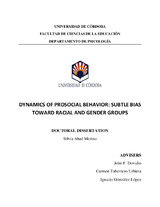Mostrar el registro sencillo del ítem
Dynamics of prosocial behaviour: subtle bias toward racial and gender groups
| dc.contributor.advisor | Dovidio, John F. | |
| dc.contributor.advisor | Tabernero Urbieta, Carmen | |
| dc.contributor.advisor | González López, Ignacio | |
| dc.contributor.author | Abad Merino, Silvia | |
| dc.date.accessioned | 2014-07-03T11:19:18Z | |
| dc.date.available | 2014-07-03T11:19:18Z | |
| dc.date.issued | 2014 | |
| dc.identifier.uri | http://hdl.handle.net/10396/12206 | |
| dc.description.abstract | Subtle forms of bias pose significant challenges to achieving equitable intergroup relations and thus have recently received considerable attention in the field of social psychology. Although explicit hostility toward minority groups seems to have faded in modern societies, cross-cultural data show that the status, resources, and the power of women and ethnic/racial minorities, compared to those of male racial/ethnic majority group members remain unequal. The present dissertation integrates, both conceptually and empirically, the findings of cross-cultural research showing the role of paternalistic and legitimizing ideas and behavior for establishing, maintaining, and reinforcing group hierarchy and the disadvantage of members of traditionally underrepresented groups. Specifically, research on helping and intergroup relations demonstrates that intergroup helping relations can be used as a strategic instrument to maintain social advantage in racial and gender relations. Theoretical insights and empirical evidence provided by research on the Intergroup Helping as Status Relations Model (Nadler, 2002) reveals that giving dependency-oriented help to low status groups is a mechanism that allows high status groups to create and maintain social dominance. The studies presented in this doctoral dissertation are based on this framework. The first chapter in this dissertation reviewed the literature on racial-ethnic and gender disparities in resources internationally and considered the role of subtle bias in perpetuating inequality. This chapter integrated theory and research on hostile and benevolent sexism, paternalism, system-justifying ideologies, and helping and status relations. Subtle, as compared to blatant, forms of bias are more likely to operate to enhance social control over racial/ethnic minorities and women in a climate in which there is widespread support for egalitarian values... | es_ES |
| dc.format.mimetype | application/pdf | es_ES |
| dc.language.iso | eng | es_ES |
| dc.publisher | Universidad de Córdoba, Servicio de Publicaciones | es_ES |
| dc.rights | https://creativecommons.org/licenses/by-nc-nd/4.0/ | es_ES |
| dc.subject | Intergroup relations | es_ES |
| dc.subject | Dynamics intergroup | es_ES |
| dc.subject | Prosocial behaviour | es_ES |
| dc.subject | Gender groups | es_ES |
| dc.subject | Racial groups | es_ES |
| dc.title | Dynamics of prosocial behaviour: subtle bias toward racial and gender groups | es_ES |
| dc.type | info:eu-repo/semantics/doctoralThesis | es_ES |
| dc.rights.accessRights | info:eu-repo/semantics/openAccess | es_ES |

